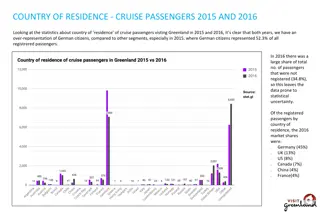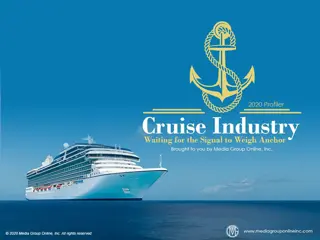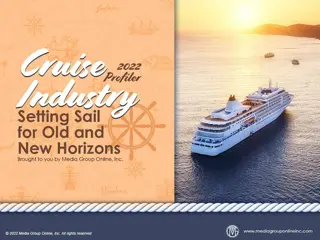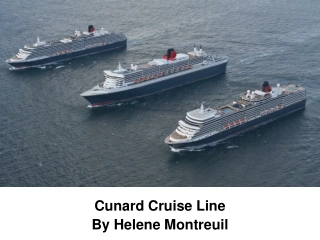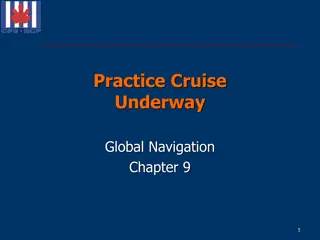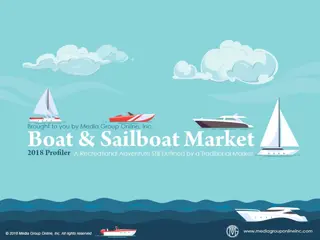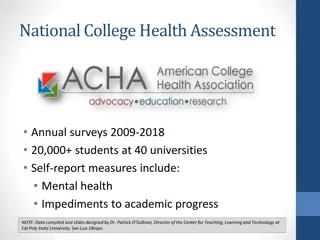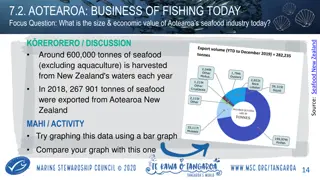Trends in the Cruise Industry for 2018: A Closer Look
The cruise industry saw a steady increase in global ocean cruise passengers in 2017 and projected a further growth in 2018. Cruise lines are expanding to offer transformational experiences, attracting a diverse range of passengers including millennials and families. Passengers' preferences, demographics, and influences on cruise selection are evolving, shaping the industry's offerings and destinations. The development of new terminals and ships by leading companies reflects the industry's continuous growth and adaptation to meet the demands of modern travelers.
Download Presentation

Please find below an Image/Link to download the presentation.
The content on the website is provided AS IS for your information and personal use only. It may not be sold, licensed, or shared on other websites without obtaining consent from the author. Download presentation by click this link. If you encounter any issues during the download, it is possible that the publisher has removed the file from their server.
E N D
Presentation Transcript
Riding a Continuous Wave of Success Although not quite as large an increase of total global ocean cruise passengers from 2016 to 2017, which was +6.0%, Cruise Lines Industry Association s (CLIA) projection for 2018 of 28.0 million passengers would be a 4.9% increase from 2017. During 2017, CLIA members operated 449 cruise ships, with 27 new ocean, river and specialty cruise ships scheduled to launch during 2018, or 12 ocean vessels and 15 river vessels, and an additional 17 cruise ships for 2019. To accommodate the increasing number of passengers and ships, Royal Caribbean is building a new $250- million terminal at Port Miami and Norwegian Cruises will open another Port Miami terminal during 2020.
Fine Sailing Throughout 2018 The attraction of cruises has expanded to include transformational experiences of cultural immersion and volunteerism, more children are cruising with their grandparents and without their parents and more destinations are in colder climates. During Q1 and Q2 2018, passenger volumes increased 6% and 8%, respectively, and passengers younger than 12 increased at the same rate as passengers older than 70 during the first two quarters of 2018, or 12% each. According to a survey J.D. Power conducted for CLIA during August 2017, a significant percentage of cruise travelers (40%) were more likely to travel as a group with friends, partners/companions or children than non- cruise travelers.
Almost Everyone Likes the Cruise Experience 2016, still at 47, and the average cruise length is approximately 7 days. The average age was younger for shorter cruises: 41 for as many as 3 days and 42 for 4 6 days. Millennials continue to be a healthy target for the industry, as 24% chose a luxury cruise during 2017, compared to 10% of all passengers. They also had the highest percentages of premium cruises, 35%, and contemporary cruises, 88%. Not surprisingly, the oldest passengers (70+) during 2017 were from Florida and California, at 16% each; however, Georgia and North Carolina had the largest percentages of passengers 20 39, at 25% each.
Ocean-Going Fun- and-Fab Factories Passengers with incomes less than $100K and more than $200K rate suite & balcony cabins as the most- important amenity; $100K $150K income, spa & salon services; and $150K $200K, celebrity chef restaurants. Not surprisingly, the destination, at 60%, was the #1 influencing factor among passengers when choosing a cruise; followed by cost, 33%; overall experience, 20%; ship, 17%; and amenities, 5%. Interestingly, child-based services, such as programs for children and babysitting, significantly influenced many cruise customers choice of cruise. Once on board, however, these services are not actually utilized much.
A World of Destinations According to the CLIA, 43% of travel agents surveyed during winter 2018 said their customers indicated an increasing interest in Cuban cruises, with 48% of agents clients citing it as a new, exotic, mysterious destination, their #1 reason to visit the island. Although the cruise industry has reduced its China- based cruises during recent years, Carnival Corp. has entered into a joint venture with a Chinese shipbuilder to send a vessel to China by the end of 2019, and then jointly building 7 additional ships. During Q1/Q2 2018, the Caribbean/Bahamas/Bermuda trade route had the largest passenger volume, or 5.65 million; however, exploration cruises to the polar regions, for example, increased the most from 2017, or 49%, followed by Alaska, +27%.
A Profitable Opportunity for Travel Agents CLIA reports 41% of travel agents said their cruise booking volume increased during winter 2017/2018, compared to 38% during winter 2016/2017. Approximately 36% of agents said their sales volume increased, compared to 22%, for the same periods. During the 2017/2018 winter season, 64% of travel agents said Alaska was the #1 destination for their clients, compared to 57% for winter 2016/2017. World cruises had the smallest increase, or approximately 9%, and the largest decrease, or 30%. The 2017 J.D. Power research for CLIA found clients/passengers were more satisfied with their cruise when a travel agent helped to plan the cruise, compared to no travel agent s assistance, at 9.29 and 8.85, respectively, on a 10-point scale.
Advertising Strategies With more Americans choosing to cruise with their friends, and often in a group, cruise lines have a great opportunity to promote a discounted group package, but direct this promotion at older adults, not just younger adult, as many seniors are also single. Any of your travel agent advertisers should include one or more of the data points on page 3 of the Profiler in their marketing and advertising, especially how their cruise-planning assistance creates a more satisfying experience. Cruise lines and travel agents can use weather comparisons to entice people to choose a respite from the cold, winter weather to cruise to warmer climates. Promote Antarctic cruise adventures during the summer and fall, as it s warmer there during North American winter.
New Media Strategies Cruise lines and travel agents should have a proactive content marketing program that provides the latest information about exciting attractions at various destinations across the globe, with links to specific tips about traveling in places, such as Cuba and China. Ask passengers who cruise for challenging and/or eco- adventures to share videos of their most unusual or daring adventure/exploration on social media during their cruise. Invite others to vote for the best, with an appropriate prize for the winner(s). Aggressively promote and create an opt-in list of current/past customers. Then, use the data about their previous cruises to sell them on choosing totally different types of destinations for future cruises, creating a cruise bucket list.


